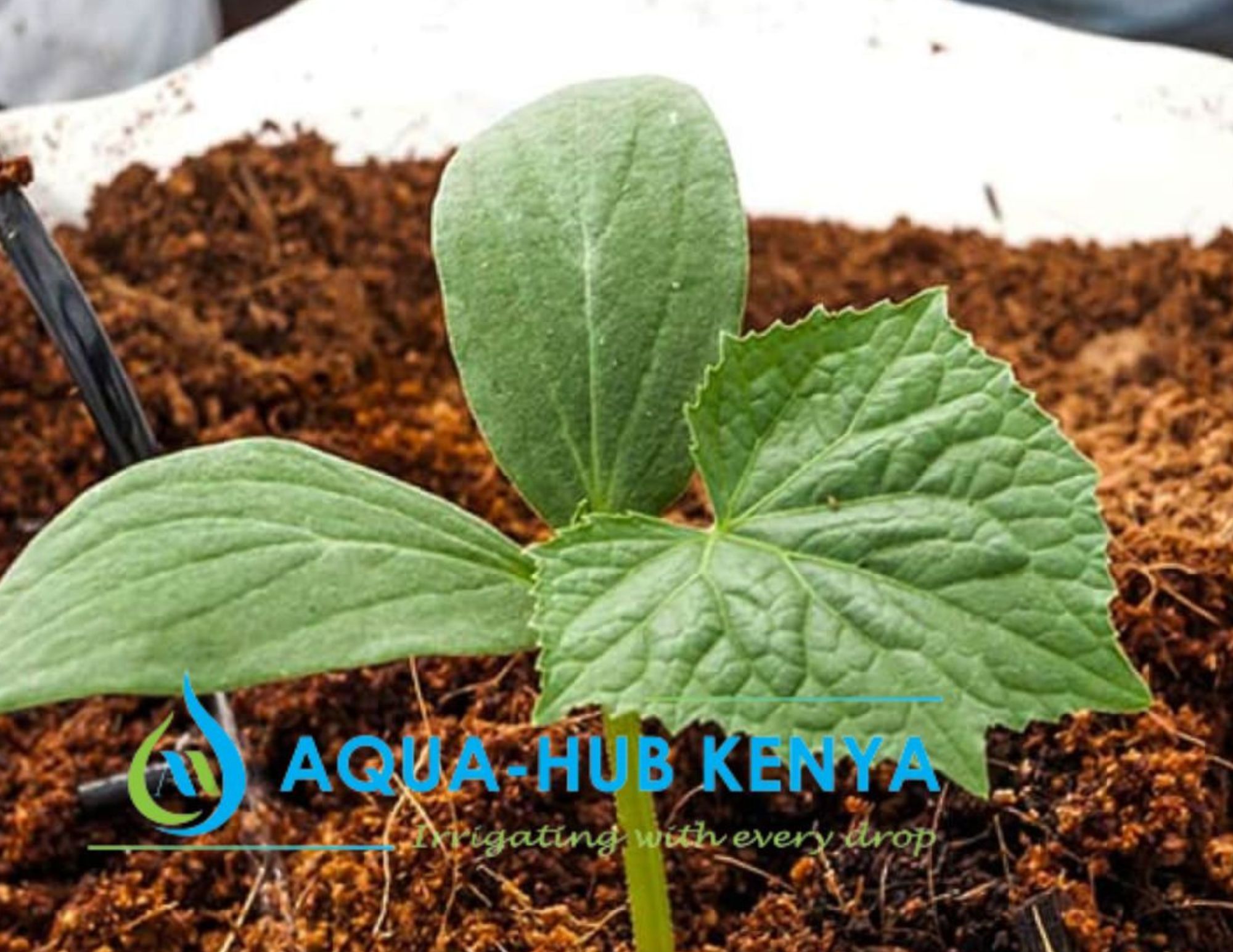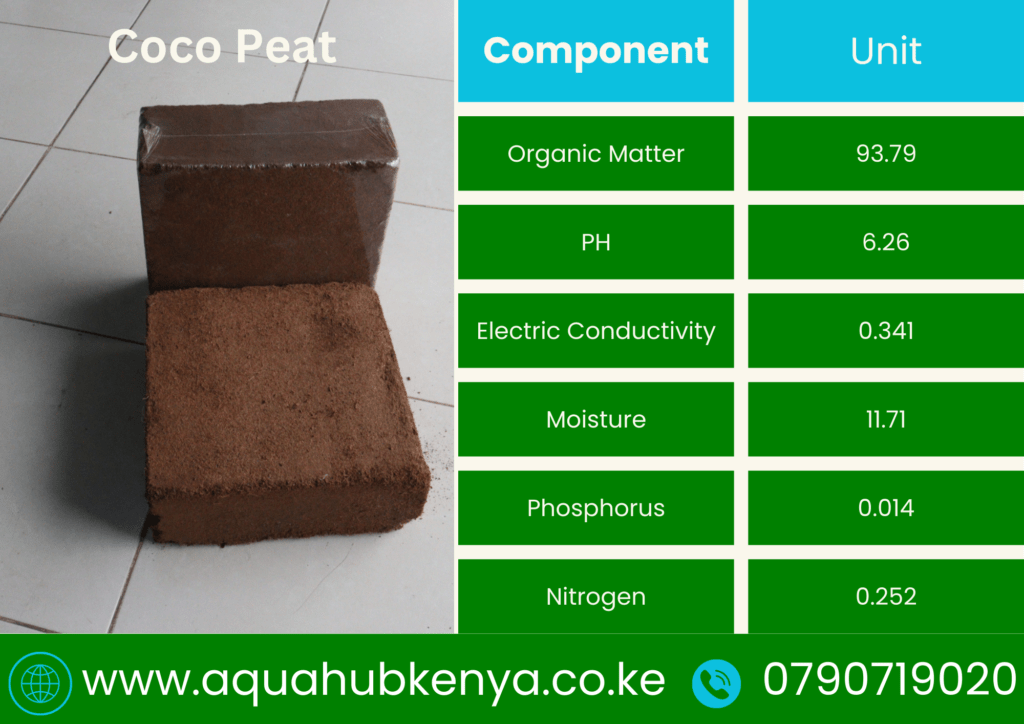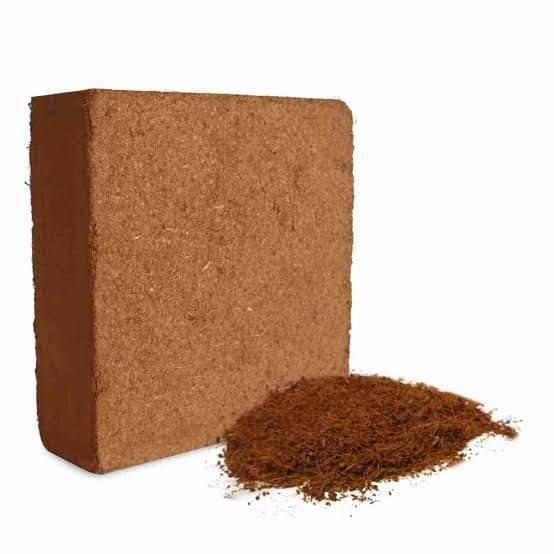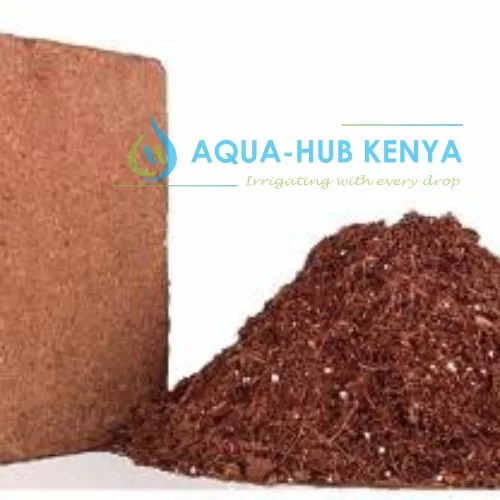Coco Peat for Seedling Propagation

Aqua Hub Kenya provides quality Coco peat blocks at affordable prices in East Africa. We offer discounts for large quantities of cocopeat.
What is Coco Peat?
Cocopeat is a special planting substance that comes from coconut husks and branches.
Coco Peat Prices in Kenya
The price of Cocopeat is KES 750 – 800 for 5kg blocks depending on the supplier.
Call: +254790719020
Who is the Supplier of Cocopeat in Kenya?
Aqua Hub Kenya is the Supplier of Coco peat in Kenya. We are a reliable dealer in quality treated Cocopeat blocks.
Call: +254790719020
Coco Peat for Sale in Kenya
Our Cocopeat is available in 5 kg blocks and costs KES 750 each.
Call: +254790719020
Best cocopeat in Kenya
Among the popular suppliers of cocopeat in the market, our cocopeat blocks are widely sought in Kenya. We offer the best cocopeat at very convenient and low price rates.
Call: +254790719020
Why Our Cocopeat is Preferable
Our cocopeat blocks exhibit the following properties that make it suitable for seedling propagation.
- Water Retention: Excellent water holding for a long time makes it ideal for sowing seeds.
- Loose nature: Enhances easier and faster root and seedling germination
- Low Electric Conductivity (EC) : Makes it ideal for plant growth
- 100 % Organic; has no effect on plant growth
- Eco-friendly; Zero pollution affects the environment.
- High porosity: The high porosity of cocopeat particles allows proper air circulation in it.
Coco Peat Vs Peat Moss: Which is Better?
Treated Coco peat is a better alternative to traditional peat moss.
Coco Peat in Nairobi
The most reliable Coco Peat Supplier is in Nairobi Kenya. Aqua Hub Kenya offers the best prices for Cocopeat blocks in Kenya.
Call: +254790719020
Coco peat in Mombasa
Cocopeat is widely used in Mombasa to propagate crops in greenhouses and farms due to large areas of sand soils.
We supply quality cocopeat to Mombasa and its region at large.
Call: +254790719020
Properties of Coco Peat
- Light is thus easy to pack and transport.
- It can store nutrients for a long time. It can be reused for a maximum of 4 years.
- Cocopeat is inorganic and thus resistant to bacterial infections.
- Has excellent drainage properties and therefore not prone to fungal infections.
- Coco peat blocks can expand up to 3 times in volume when soaked in water and thus enough to fill upto 15 trays each.
- Consistent and uniform in nature and thus easy to handle
- Cocopeat has a slow decomposition and thus is durable for a long time, providing long-term use.
- Has a low PH level of 5.8 to 6.8 which is less acidic and thus ideal for the growth of most plants.
- It can be mixed with soil and compost manure to provide an excellent growing medium that is reliable for variety of plants.
- Cocopeat is available at an affordable price for a quality product with an environmentally sustainable future.
Treating Coco Peat
Coco peat should be treated (washed) to remove salts that often are contained in the coconut husks.
If used without treating, it will result to scorching and thus poor germination caused by excess sodium salts.
How to Treat Coco Peat
- First, break the cocopeat blocks into fine dust.
- Pour approximately 25 liters of water into a bucket for every 5 kg blocks of water.
- Soak the cocopeat dust in water
- Add Calcium nitrate to the mixture and leave it for 12 hours for salts to dissolve in water.
- Drain the excess water from the cocopeat and rinse with clean water.
Steps for Using Coco Peat
- Place treated Coco Peat into trays, pot or containers depending on the intended use
- Sow the seedlings, plants or transplanted seedling.
- Water the trays or pots until moist enough.
What are the Common Uses of Coco Peat?
- Growing of flowers and potted plants in homes and residential buildings
- Works as a soil conditioner. Used to improve the physical properties of soil such as nutrient holding and retention capacity.
- Applications in in-house environments to propagate vegetable seedlings. It requires planting trays to enhance propagation.
- Nursery tree seedling propagation
- Hydroponic systems
- Planting lawns grasses and tuffs.
- Growing Mushrooms
- Animal bedding in pet houses, poultry, and livestock farms as they quickly absorb and drain water.
How long Does Coco Peat Last?
Coco peat lasts for up to 3 years when used properly. Stored Cocopeat is durable only when it kept in a dry and cool place.
How long Should Cocopeat be Reused?
Cocopeat should be applicable for a minimum of 3-4 crop cycles or 1 year.
How to Preserve Cocopeat Blocks
Store in a cool and dry place ; Keep away from moisture, rain or direct sunlight.
Keep them in a closed structure to prevent air and moisture contact.
Ensure you store in a cool place; Do not expose to high temperatures.
Avoid Contamination: keep the cocopeat away from fertilizers, chemicals, and pesticides.
Benefits of Using Cocopeat in Propagation
- Cocopeat is cost-effective – its reusability allows you to save money, instead of buying new cocopeat every time.
- It is sustainable as it does not cause environmental pollution or crop diseases.
- Weed control – Does not support weed growth and thus enhances proper seedling growth.
- Promotes sufficient nutrient distribution – Cocopeat has a high nutrient-capacity compared to other substrates.
- Cocopeat is reliable in propagation for areas with soils infected with diseases such as fusarium.
- Saves on the Cost of Pesticides and Herbicides
Where to buy Cocopeat in Kenya
Buy Cocopeat from Aqua Hub Kenya.
Call :+254790719020



